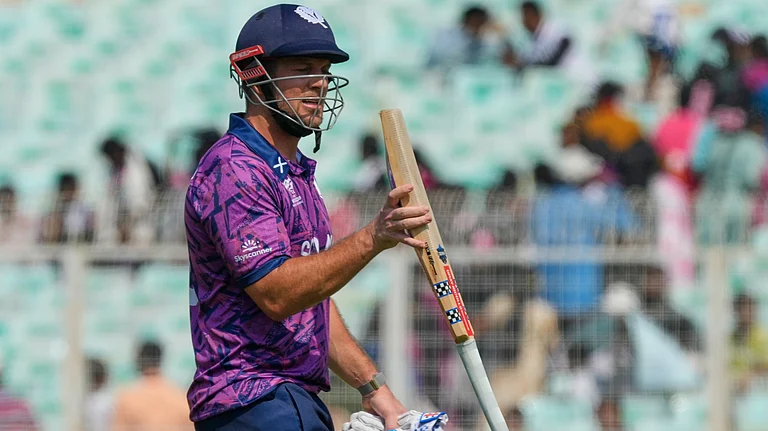ITs a mission aborted, as far as the marketing of West Bengal Chief Minister Jyoti Basus authorised biography is concerned, barely two weeks after its much-hyped launch on January 29 at the annual Calcutta book fair. The publishers, Viking-Penguin, in their apparent hurry to cash in on the projected sales at the fair, did not bother to crosscheck the contents. Now, in a desperate salvage operation, efforts are under way to issue a new, corrected version of the biography as soon as possible.
The publishers are not the only ones to end up with red faces. The mood at Alimuddin street, headquarters of the CPI(M) and the Left establishment, is sombre. The party has become indirectly associated with the book by the authors use of the word "authorised". A state committee member does some frantic explaining: "The author approached us for some assistance from time to time and in good faith we cooperated. But it was her project and we cannot be accountable for what she has written. We are intrigued over the term authorised. Now, who has authorised the biography? Not us. We have our own National Book Agency to handle our publishing work. Nor has Jyoti Basu, who states in the foreword that the quotes are his, but the rest is all hers."
According to sources, the party is also hard put to explain why Professor Surabhi Banerjee was favoured as the biographer. "We could not very well stop her or anyone else, for that matter. As it is we are called Stalinist, secretive," quips one source. Ironically, the furore may actually help Basu in handling his critics in the coming Central Committee meet. Hardliners favour some form of censure, however mild, for the CPI(M) veteran for criticising his colleagues about their lack of political consciousness in opting to stay out of the Central Government last May.
After Basus public outburst, that led the media to speculate that there are "serious differences" in the CPI(M) leadership, even senior ideologue E.M.S. Namboodiripad chipped in to stem the debate. In his column in the February 7 Frontline, he writes that the issue of joining the Government had been settled in May itself when a majority in the Central Committee decided against participation. According to him, if anybody in the minority desires to reopen the issue, he can either demand an inner-party discussion or bring it up at the next party congress.
But the debate rages on nevertheless. That the biographer bungled on her facts while writing about the Lefts leading light has obviously pleased the Opposition Congress in West Bengal, which is making hay. Says Congress MLA Sougata Roy: "The book is nothing but a romanticised, glamourised account of an individual, the picture postcard side of his family life. It has nothing to do with political developments that shaped Bengal, or the negative side of Basu, his shortcomings as an administrator, his wrong assessment of the power position in Bengal, his many mistakes, his short temper, and so forth. I do not think much of it."
As expected, CPI(M) members are least enthusiastic about the book. Says party MP, Sudarshan Roy Choudhury: "I have read excerpts and there is too much accent on Basu, the family man, and not enough on his political maturing, his contributions, or role in party debates. We have been privileged enough to see him from close. I do not think Basu the leader has come through at all in the book".
Central Committee member and party ideologue Biplab Das Gupta isnt happy with the biographer to begin with. "I do not know why the author chose such a subject. It takes a political person or someone with political knowledge to write a good biography, especially about a Communist leader. The course of the Communist movement here has been very complex and I do not know much about the project."
And though Charubrata Ray, a Marxist observer, does not want to run down the biographers efforts, he still feels that the book reads more like a "narrative of Bengal developments rather than the life of an all-India Communist leader."
The biographers efforts have been made that much more difficult because she is dealing with a stalwart of the CPI(M), a party that approaches political biographies in general as it would a minefield. Some years ago, when Namboodiripad wrote his i nformative autobiography, politburo member, late M. Basavpunniah, expressed his reservations quite openly. His basic stand was that it was somewhat pompous for living figures to have their biography written and people should ponder their own contributions before embarking on their autobiographies. And Left old-timers also recall the amused reaction of Ho Chi Minh on finding Muzaffar Ahmed seated under a large portrait of himself in the party office, during a visit to Calcutta.
On her part, Surabhi Banerjee, who has written 15 other books, apart from translations from other languages, remains unfazed about what has happened. She told Outlook : "No book is perfect. There may be some mistakes here and there, printing errors, typographical errors etc. Maybe our editors should have been more careful. However, I am talking to them now and we plan to set everything in order within a month or so. It is not the first time I have written a biography, I did one of Satyajit Ray some time ago." So within two weeks of the launch of her book, there is to be an amended version from the publishers.
The citys publishers are aghast at the shoddy handling of the book. Says a leading city publisher: "Mistakes, both of the elementary, factual variety, some glaring omissions and many instances of wrong emphases, abound in the book. Clearly someone has been very careless and the pre-launch hype is an embarrassment for the industry."
Banerjee, however, blames the brouhaha on a motivated campaign against her. In any case, the reference to her Ray biography does not exactly improve matters readers say that that too was full of mistakes. For the rest, there must be an immediate clarification about the term "authorised" as appended to the Basu book.
In future, both Basu and Anil Biswas, party ideologue and Ganashakti editor, should be more judicious in choosing their Boswells. The biographer insists that both Basu and Biswas have been closely associated with the book. The key question: would either Basu or Biswas have given her such obviously incorrect data to work on?






















